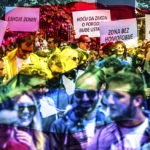The first question most parents are asked upon the baby’s birth, is “Is it a boy or a girl?” But for parents of intersex babies, that might not be an easy question to answer.
Intersex people are born with sex characteristics that do not fit into the binary notions of male and female bodies that most people are used to. Their genitals, gonads and/or chromosome patterns are configured in a way that results in a body that is not always easily categorized as male or female.
According to the UN Free and Equal campaign, experts estimate that up to 1.7 percent of the world population is born with intersex characteristics. That means that the chance to be intersex is almost as big as the chance to be a redhead. Sometimes these variations are visible at birth, but other times they become visible only later on during puberty. Some variations in chromosome patterns might not be visible at all.
In Kosovo, according to the Law on Civil Status, parents need to register the birth of a new child within 15 days of birth, or in exceptional cases within 30 days (the law is not clear on what is considered an exceptional case). The birth certificate has to state the sex of the child, and Kosovo documents follow the binary notion of allowing only for the option of female or male. In the case of intersex babies, the law gives doctors the power to determine the sex of the baby.
Article 32.3 of the Law on Civil Status states: “When the child’s genital organs have disorders, the gender shall be established by a medical report.” Defrim Kocinaj, a pediatric surgeon at the University Clinical Centre of Kosovo (QKUK), explains in an email that the sex is determined through a clinical assessment by a pediatric surgeon, followed by lab analysis and radiologic examinations. He adds that intersex characteristics are not common, and thus “experiences of countries with small populations (such as us), are few.”
One way that QKUK has overcome this is with the help of outside surgeons, such as Professor Paddy Dewan, who is the founder of the Kind Cuts for Kids NGO from Australia, as well as other surgeons from the organization. These surgeons visited Kosovo five times between 2011 and 2015, and in that period performed operative procedures on five intersex youngsters, according to their report from the 2015 visit.
Kocinaj says that these visits, coupled with training in hospitals around Europe and Turkey, have helped Kosovo doctors develop capacities to undertake such surgeries. “Some cases that are more common, can be operated by us too,” he says.
Some Kosovo families might also opt for procedures in Belgrade. Kristian Randjelovic, Executive Director of Belgrade based XY Spectrum, an organization that works on advancing the life quality of intersex and transgender persons, says that for a few decades now a medical team in Belgrade operates on about eight to 10 intersex children per year, but that there are no clear statistics on where these children are from.
“They follow the protocols made in hospital for children with hermaphroditic genitalia,” explains Randjelovic. The hospital still uses the term “hermaphroditic,” which refers to animals with both functioning male and female organs. Medical Professionals and intersex activists consider its use in relation to humans scientifically inaccurate and stigmatizing.
“Lots of intersex babies are healthy, there’s nothing problematic with their health, but the appearance of their genitalia can be problematic for medical professionals,” says Randjelovic. “If it doesn’t fit in binary boxes, doesn’t look like a proper penis or vagina, they [the doctors] are doing a lot of things, a lot of surgeries to ‘fix’ them, to make them look this or that way. For a lot of reasons, this is problematic.”
Going under the knife
Throughout the world, these operations are usually done early in life, with the first one usually happening when the intersex person is just an infant or a little child. Kocinaj explains that the age at which the operation is performed depends on whether the baby is determined to be male or female.
“Feminizing genitoplasty [plastic surgery to (re)construct a vagina] is performed at neonatal age, while masculinizing genitoplasty [plastic surgery to (re)construct a penis] is postponed till 1-2 years old,” he says.
As such, the person on whom the operation is conducted is incapable of giving consent. Doctors usually get the consent from the parents, though there have been reports of cases outside of Kosovo when the doctors lied to the parents.
Randjelovic believes that the often technical language with which the procedures are explained by doctors to parents can be difficult to understand. With the lack of other people involved in the process, Randjelovic believes that many parents put their trust in medical professionals, and have no other notion of how to proceed.
In an interview conducted through the Facebook account of Kind Cuts for Kids, Dewan says that they make decisions on the need and type of surgical intervention in collaboration with the family, the older child if the problem has gone untreated, with pediatricians and surgeons. “Some patients do not have surgery as part of their management and some require a lifetime of medical management in addition to surgery,” he says.
Intersex people, just like everyone else, can grow up identifying as a man, a woman, both or neither, and this does not necessarily reflect the sex determined on their birth certificate. According to a Council of Europe report: “In the case of intersex people, estimates of assigning the wrong sex to them vary from between 8.5 and 40 percent. These children end up rejecting the sex they were assigned at birth demonstrating the major infringements of their psychological integrity.”
While Dewan emphasizes that “the surgery is not insignificant,” he believes that “the decision about what to do is the most important part of the management process.” However, there appears to be little discussion about this from Kosovo’s doctors.
Arber Nuhiu, Executive Director of Kosovo-based LGBTI NGO Center for Social Group Development (CSGD), says that “in conversations with doctors, I have noticed that for them it is very normal [to conduct sex determination surgery] if they have the approval of the parents; they take it the same as with all the other health interventions on a child where they get the parents’ approval.”
Nuhiu adds that “children’s human rights are definitively infringed, because you don’t know how they [the intersex person] will feel when they grow up — a woman or a man, or neither a woman and neither a man. Someone else is determining their gender and sex, not the person themselves.”
Finding a place
The interventions can also cause trauma, and this might be one reason why the intersex community in the region is almost invisible.
“People are traumatized in the process with medical interventions and I guess are not aware that they are intersex or they never had anyone talk to them about the condition, or even if they have any information about it, they didn’t feel comfortable to open up about that to anyone else,” says Belgrade based intersex advocate Randjelovic.
And there is stigma as well. “Drawing parallels with other LGBT communities, not everyone decides to be vocal because our society makes it impossible, there is a lot of prejudice from the very start,” states Blert Morina, Executive Director of Centre for Equality and Liberty of the LGBT community in Kosovo (CEL).
In recent years in Kosovo there has been some modest progress in terms of talking about, protecting the rights of, and addressing the issues faced by lesbians and gays. (There is little public mention of bisexuals as a separate community, with their rights being to some degree implicitly addressed through work with gay and lesbian communities.)
In the last year, there has also been more public discussion about the rights of trans people. However, there has been very little discussion about intersex people. LGBTI rights NGOs in Kosovo have to date also been relatively quiet on the issue.
“We’re still hesitating because of a lack of knowledge,” says Nuhiu from CSGD. “We [the LGBTI rights NGOs] are mentioning it as an issue that we need to deal with, but we still haven’t started. We’re also scared a bit. Because it’s not good to start something, even if you see a lot of problems, if you don’t have a professional background.”
In recent years, the United Nations and the Council of Europe have called for a repeal of laws that allow surgeries without the intersex person’s consent. This is a demand that has been made by intersex advocates too, who in the Malta Declaration of 2013 called for “an end to mutilating and ‘normalizing’ practices such as genital surgeries, psychological and other medical treatments through legislative and other means. Intersex people must be empowered to make their own decisions affecting own bodily integrity, physical autonomy and self-determination.”
To date, Malta is the only country that has passed legislation banning such surgeries. Its 2015 law protects the bodily integrity and physical autonomy of intersex minors by banning medical procedures and treatments until they are of age when they can provide informed consent. Parliaments, courts, bioethics bodies and/or ministries of a few other countries (Australia, Switzerland, Colombia, Chile and Germany) have addressed the need of full informed consent of the intersex individual prior to any “normalizing” treatment.
Other measures that respect the human rights of intersex people, identified in the Council of Europe report, include Finland and Portugal not imposing a time limit on the registration of the baby’s sex in cases of intersex babies, Australia, Malaysia, Nepal, New Zealand and South Africa allowing “X” as a passport entry for sex, while India, in its “passport application form allows for three gender categories: ‘Female’, ‘Male’ and ‘Others.’”K
Feature image: Majlinda Hoxha / K2.0.

Back to LGBTI Rights Monograph


